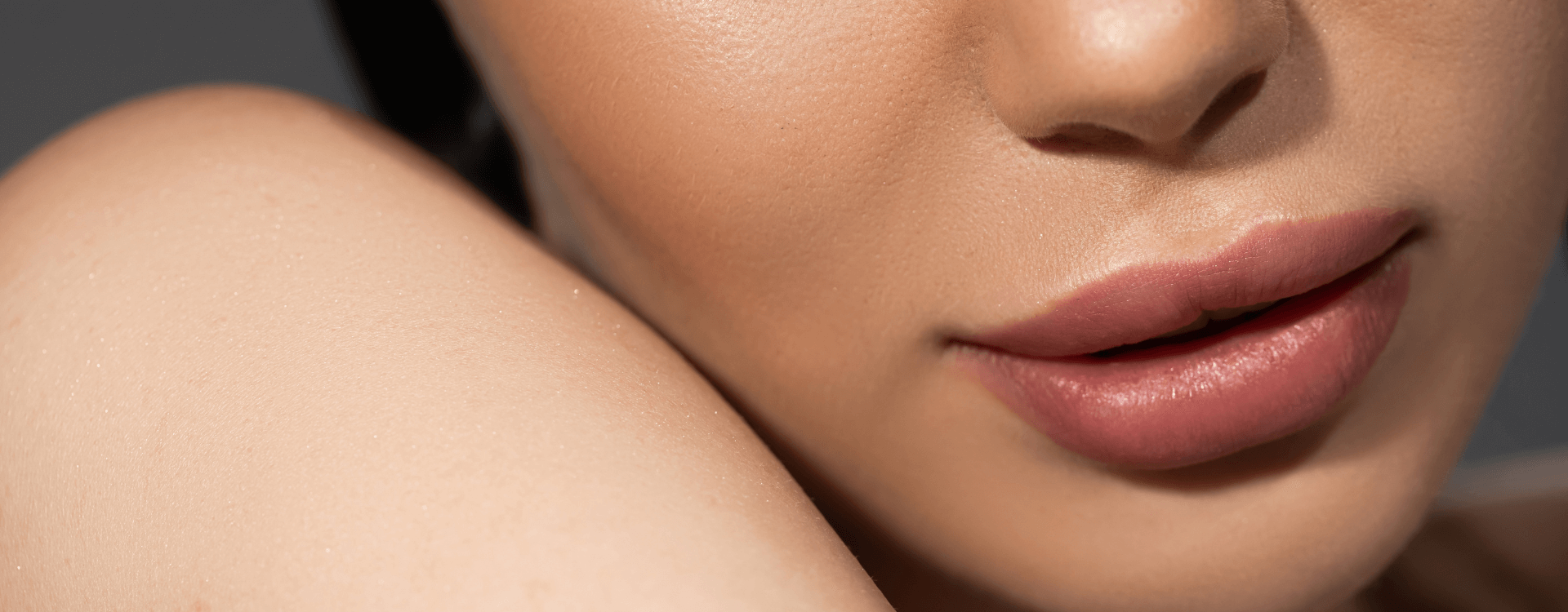What Are Lip Fillers?
Lip fillers are soft, injectable gel-based treatments made with hyaluronic acid, a substance your body naturally produces to keep skin smooth and hydrated. They are used to gently enhance lip volume, improve symmetry, and soften fine lines for a balanced, natural look.
At Montville Medspa & Pain Center, we use trusted, FDA-approved hyaluronic acid fillers selected for their safety, softness, and beautiful, natural-looking results.
What Lip Fillers Can Treat
At Montville Medspa & Pain Center in Montville, NJ, our lip filler treatments can improve:
Thin or Deflated Lips
Restores natural fullness lost with age or genetics.
Lip Shape + Definition
Enhances the vermillion border, defines the Cupid’s bow, and improves symmetry.
Smoker’s Lines & Fine Wrinkles
Softens vertical lip lines for a smoother, more youthful appearance.
Lip Hydration + Smoothness
fillers attract water, improving hydration and lip texture.
Why Choose Montville Medspa?
Choosing where to get lip fillers isn’t just about price or convenience; it’s about trust, safety, and results that look like you, only better. That’s where Montville Medspa stands apart.
Your Lips Are Treated by a Physician-Led Team Time
At Montville Medspa & Pain Center, lip filler treatments are performed by highly trained medical injectors, led by Dr. Donna D’Alessio. Every treatment follows strict medical protocols designed to prioritize safety, precision, and natural-looking results. Our providers are trained in facial anatomy, vascular safety, and complication management, allowing for safer injections, smoother healing, and more predictable outcomes
Results That Look Natural, Not “Done”
Our patients consistently tell us that people notice they “look great”, but not “injected.” Our team focuses on balance, proportion, and subtle refinement, creating lips that fit your face, age, and natural features. We don’t follow trends, and we don’t overfill. Whether you want a small enhancement or more noticeable volume, your treatment plan is designed around your lips alone, not a standard technique or preset syringe amount.
High-Quality Fillers Only
We only use HA fillers that are clinically proven to perform well in delicate lip tissue. No experimental products. No fillers known for stiffness or migration.
Consistent Care, From Consultation to Follow-Up
You’re not shuffled between providers. You see the same physician for your consultation, your treatment, and your follow-up, allowing for better planning, better continuity, and better long-term results.
How the Procedure Works
Achieving natural, plump lips is as much about technique as it is about the filler itself.
Consultation:
We discuss your goals, answer questions, and set clear expectations.
Procedure:
Lips are gently cleansed and numbed for comfort. Using a fine needle, HA filler is carefully injected to enhance volume, symmetry, and smooth lines. The hyaluronic acid attracts water to create soft, natural fullness.
Aftercare:
You’ll receive simple post-treatment instructions. Recovery is quick, and most patients return to daily activities immediately.
The Brands We Trust
At Montville Medspa & Pain Center, we trust only the best. Discover the premier range of hyaluronic acid (HA) fillers we offer to meet various aesthetic needs.
| Filler Name | Purpose and Effect |
| Juvéderm® Volbella™ XC | Designed to re-volumize the lips with a subtle effect. Achieves natural-looking results and blurs lip lines. |
| Juvéderm® Ultra XC | Offers a poutier effect compared to Volbella™ XC. Perfect for adding noticeable contours to luscious lips. |
| Revanesse® Versa™ | The first HA fillers FDA-approved for dynamic wrinkles and folds, distinct from Juvederm®, which addresses static wrinkles from collagen loss and intrinsic aging. |
Who is an Ideal Candidate for Lip Fillers?
Lip filler can be a great option for many, but it’s particularly suited for:
- Those seeking a more defined lip shape
- Individuals wanting to enhance their cupid’s bow
- People looking for a lifted appearance rather than just fullness
- Those with naturally thin lips or a flat lip profile
Age and skin quality are factors to consider. Younger individuals with good skin elasticity often achieve the best results. However, the technique can be adapted for various lip shapes and sizes.
Benefits of HA Lip Fillers
When it comes to enhancing your lips, Hyaluronic Acid (HA) fillers stand out for several compelling reasons. Let’s delve into the notable benefits.
Natural Composition
Hyaluronic acid is naturally found in the skin, helping lips look soft, smooth, and hydrated. HA fillers blend seamlessly with your body for natural-looking, comfortable results.
Controlled Lip Volume
HA fillers allow precise control, so you can choose subtle enhancement or fuller volume based on your personal goals.
Gradual Treatment Option
You can build volume gradually over multiple sessions, making HA fillers ideal for first-time patients or those wanting a conservative approach.
Minimal Side Effects
Because HA is naturally occurring, side effects like swelling or bruising are typically mild and temporary.
Reversible Results
If needed, HA fillers can be safely dissolved with the enzyme hyaluronidase, offering peace of mind and flexibility.One of the unique benefits of HA lip fillers is their reversibility.
Long-Lasting Yet Non-Permanent
Results last for months but are not permanent, allowing you to adjust or refresh your look over time.
What Are The Risks and Side Effects?
Lip fillers can cause temporary swelling, bruising, or tenderness, and may occasionally lead to unevenness while the filler settles. Rare risks include infection, cold sore flare-ups, lumps, or vascular complications.
Your risk is significantly reduced at Montville Medspa because all injections are performed under the supervision of a board-certified physician trained in facial anatomy and injection safety. This increases our team’s ability to recognize early signs of complications, help ensure safer treatment, and a smoother recovery.
Ready To Try Lip Fillers at Montville Medspa?
Ready to embrace the allure of fuller, symmetrical lips? Take the first step.Schedule a consultation and rediscover your most radiant self. Your journey to confidence and wellness begins with just a click.
FAQs
Are there any specific aftercare guidelines following the lip filler procedure?
After the procedure, you may experience some swelling or bruising at the injection sites. Applying an ice pack can alleviate this. Avoid vigorous physical activity, excessive sun or heat exposure, and alcohol for the first 24 hours post-treatment. Keeping the lips moisturized and refraining from massaging them is also essential. For a comprehensive guide, always follow the instructions given by your plastic surgery or aesthetic specialist.
How Much Do Lip Injections Cost? What Affects the Price?
Most patients need one syringe for natural-looking results. Pricing varies based on filler type and treatment goals and will be discussed during your consultation.
Have More Questions?
Contact Us to Schedule a Consultation
We’re actively servicing patients from the following areas
Montville, NJ
Service Areas:
Lip Filler FAQs
Why is a consultation necessary before getting lip fillers in New Jersey?
A consultation is essential to ensure safe and natural results. During your appointment, your provider will review your medical history, allergies, and medications, and assess your facial structure and lip shape. This allows us to create a personalized treatment plan tailored to your goals and ensures you feel informed and confident before your procedure.
What should I avoid before getting lip fillers?
Certain medications and supplements can increase the risk of bruising, swelling, or bleeding. We recommend avoiding blood thinners, anti-inflammatory medications like ibuprofen, herbal supplements such as ginkgo or fish oil, and high doses of vitamin E. Your provider will guide you on how to safely pause or adjust these if needed.
How should I prepare my skin for lip filler injections?
Proper skin preparation helps achieve smooth, long-lasting results. In the weeks leading up to your appointment, do the following:
- Cleanse and hydrate your lips daily
- Protect your skin with SPF, and avoid chemical peels or laser treatments
- Pause strong retinoids
This helps reduce sensitivity and ensures the filler integrates seamlessly.
Does food or drink affect lip filler results?
Yes, certain dietary habits can influence swelling and recovery. It is best to avoid alcohol for at least 24 hours before your appointment, stay well-hydrated, limit salty foods, and eat antioxidant-rich fruits and vegetables. A light, balanced meal before your appointment also helps you feel comfortable during the procedure.
What should I do after my lip filler treatment?
After your treatment, applying ice packs can help reduce swelling and discomfort. Following these recommendations will also help your lips heal properly and your filler settle evenly.
- Keep your lips moisturized
- Avoid massaging them excessively
- Refrain from intense exercise or sun exposure for 24–48 hours
- Avoid makeup for at least 24 hours
How long do lip fillers last?
The longevity of your lip fillers depends on the type of product, injection technique, and your metabolism. Most hyaluronic acid fillers last 4–12 months, while denser fillers like Juvederm Voluma or Restylane Lyft can last up to 24 months. Follow-up touch-ups every 6–18 months help maintain volume and shape.
Can I have an allergic reaction to lip fillers?
Allergic reactions to hyaluronic acid fillers are extremely rare because HA is naturally found in the body. However, it is important to share any past allergic reactions or medical conditions with your provider to ensure safety and optimal results.
Can lip fillers be combined with other cosmetic or dental procedures?
Yes, lip fillers can often be combined with other cosmetic treatments to achieve a comprehensive rejuvenated look. However, if you plan to undergo dental procedures or additional facial treatments, inform your provider so that your treatments are appropriately spaced to prevent complications or irritation.
How do lifestyle factors like exercise affect lip filler results?
Normal exercise does not usually impact your lip filler results as long as you follow aftercare instructions and wait at least 48 hours before resuming strenuous activity. Active lifestyles may cause fillers to metabolize slightly faster, but this typically does not significantly affect the overall outcome.
What are the alternatives to lip fillers?
For patients seeking longer-lasting or permanent options, lip implants or fat grafting are alternatives. Laser treatments and resurfacing may also improve lip texture and appearance. However, lip filler injections remain the most minimally invasive, reversible, and customizable option for enhancing lip volume and shape.






